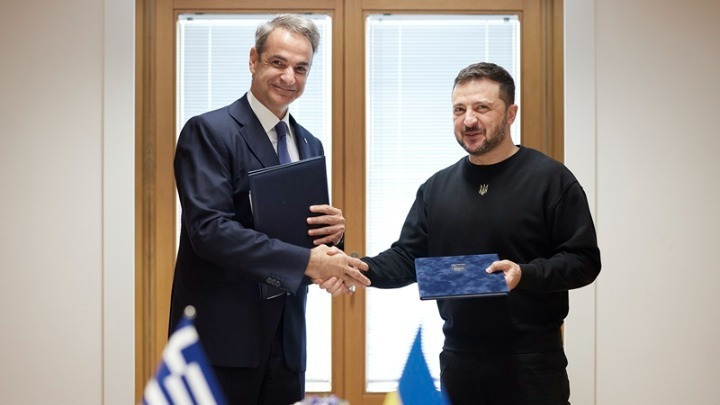Greek PM and Ukrainian President sign Greece-Ukraine bilateral security agreement in Brussels

Greek Prime Minister Kyriakos Mitsotakis and Ukrainian President Volodymyr Zelenskiy on Thursday signed a bilateral agreement for cooperation between Greece and Ukraine on security, on the sidelines of the European Council in Brussels. Greece is now the 21st European Union member-state to sign a similar bilateral agreement with Ukraine.
The agreement comes after the EU and Greece joined the G7 Statement for the support of Ukraine’s security and the equivalent EU-Ukraine agreement signed on June 27, 2024 in Brussels.
According to the government, it opens up the way for Greece’s active participation in efforts to rebuild Ukraine.
The bilateral agreement for the multifaceted support and reconstruction of Ukraine, along the lines of equivalent bilateral agreements signed with the majority of EU member-states, aims chiefly at enhancing Ukraine’s resilience and to provide support for the country and its accession course.
It envisages cooperation and joint ventures in a series of sectors, such as the economy, reforms, energy, civil protection, the reconstruction and recovery of Ukraine, cultural cooperation and the protection of cultural heritage.
Particular emphasis is given to Ukraine’s reconstruction – especially in Odessa, whose rebuilding the prime minister had pledged to support due to its history and ties with Greece in his visit there in March. Reconstructon also presents opportunities for Greek companies and for collaboration with both European and Ukrainian firms. The agreement includes a mutual commitment for cooperation between companies of the two countries, as well as cooperation in production and the transfer of green energy, maritime transport and logistics.
It should be noted that Greece organised a big Conference on the Reconstruction of Ukraine last February. Regarding military and defence aid, government sources said that Greece supports and will continue to support Ukraine, to the extent possible and provided that this does not compromise domestic defence capability. This support is already provided for in commitments made by Greece within the EU and NATO.
Source: ANA-MPA




